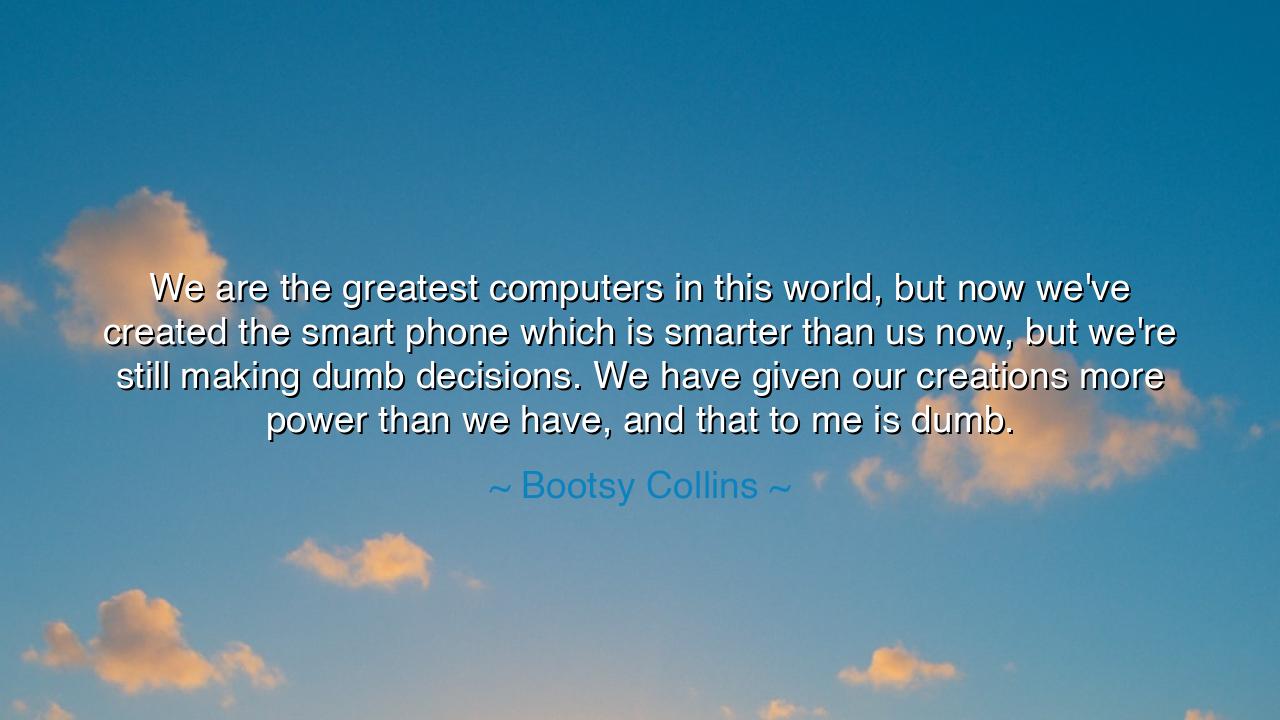
We are the greatest computers in this world, but now we've
We are the greatest computers in this world, but now we've created the smart phone which is smarter than us now, but we're still making dumb decisions. We have given our creations more power than we have, and that to me is dumb.






“We are the greatest computers in this world, but now we’ve created the smartphone which is smarter than us now, but we’re still making dumb decisions. We have given our creations more power than we have, and that to me is dumb.” Thus spoke Bootsy Collins, the legendary musician and philosopher of funk — a man who has seen both the beauty and absurdity of the modern age. Beneath his playful words lies a warning wrapped in rhythm, a truth both ancient and prophetic. For in this saying, Bootsy does not merely speak of machines and music; he speaks of the human soul, of a world where man, the creator, bows before his own creation. His tone is not of bitterness but of sorrowful awe — the lament of a being who once ruled through imagination and now finds himself ruled by his inventions.
In the ancient days, man’s tools were extensions of his body — the spear for the hand, the wheel for the foot, the torch for the eye. These creations amplified his power but never challenged his spirit. Yet as the centuries passed, his tools began to think for him. The computer, the proud child of human genius, became more than a servant; it became a mirror — one that reflected not only intellect but dependency. The smartphone, that tiny oracle in every palm, now carries the knowledge of ages, yet leaves its bearer empty of wisdom. This is the paradox Bootsy reveals: that in building intelligence outside ourselves, we have allowed the inner intelligence — the intuition, empathy, and clarity that make us human — to atrophy.
Bootsy, a man of art and rhythm, understands creation at its deepest level. He knows that the spark of genius that makes a melody or a machine is divine, born from the same fire that once painted the heavens. But he also knows that power without reflection breeds chaos. His words, “We have given our creations more power than we have,” recall the old myths — the tale of Prometheus, who brought fire to mankind and was chained for his defiance, or Frankenstein, who made life and was destroyed by it. These stories whisper through his quote like echoes of forgotten warnings: that when man forgets his place as the master of his tools, he becomes their servant.
There is a story of the great physicist Albert Einstein, who once feared that technology would surpass humanity, saying, “It has become appallingly obvious that our technology has exceeded our humanity.” Bootsy’s words are the same truth sung in a different key. The smartphone, though brilliant, cannot love, forgive, or dream. It cannot create funk or poetry, nor can it cry at the beauty of a sunset. Yet we, the makers of this machine, have begun to behave as if it knows better than we do — consulting it before we think, believing it before we feel, obeying it before we question. The danger, Bootsy warns, is not in the machine’s intelligence, but in our abandonment of our own.
And yet, there is hope in his laughter, for Bootsy’s wisdom is never without joy. His words remind us that we are still the greatest computers, fashioned not from metal and code, but from spirit, heart, and consciousness. The brain may calculate, but the soul creates — and no smartphone, no algorithm, can surpass the poetry of a human mind in love or the compassion of a heart awakened. We must reclaim the throne of awareness that we have yielded to our devices. We must remember that technology was made to serve us, not to define us.
This, then, is the lesson for our time: use your tools, but do not worship them. Let the smartphone be a servant of your purpose, not the master of your attention. Think before you ask the machine to think for you. Listen to the still voice within before you seek validation from a screen. For every great civilization that has fallen did so not from lack of invention, but from the loss of wisdom — from confusing power with understanding, and possession with purpose.
So, O children of the digital dawn, hear the teaching of Bootsy Collins. You are the instrument, not the machine. You are the composer, not the code. Let your mind be the conductor and your tools the orchestra, but never let them steal the rhythm of your soul. For the moment you forget that you are greater than your creations is the moment you become smaller than them. Keep your spirit sharp, your heart awake, and your humor intact — and you shall never bow to the false gods of technology, but instead make them dance to the music of your making.






AAdministratorAdministrator
Welcome, honored guests. Please leave a comment, we will respond soon